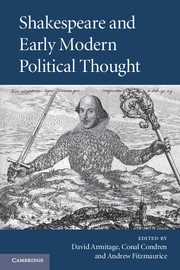Book contents
- Frontmatter
- Contents
- List of contributors
- Acknowledgements
- List of citations and abbreviations
- Introduction
- PART I CONTEXTS
- PART II THE COURT
- PART III THE COMMONWEALTH
- 10 Putting the city into Shakespeare's city comedy
- 11 Talking to the animals: persuasion, counsel and their discontents in Julius Caesar
- 12 Political rhetoric and citizenship in Coriolanus
- 13 Shakespeare and the best state of a commonwealth
- Afterword: Shakespeare and humanist culture
- Index
12 - Political rhetoric and citizenship in Coriolanus
Published online by Cambridge University Press: 18 January 2010
- Frontmatter
- Contents
- List of contributors
- Acknowledgements
- List of citations and abbreviations
- Introduction
- PART I CONTEXTS
- PART II THE COURT
- PART III THE COMMONWEALTH
- 10 Putting the city into Shakespeare's city comedy
- 11 Talking to the animals: persuasion, counsel and their discontents in Julius Caesar
- 12 Political rhetoric and citizenship in Coriolanus
- 13 Shakespeare and the best state of a commonwealth
- Afterword: Shakespeare and humanist culture
- Index
Summary
This chapter examines the role of political rhetoric in Shakespeare's Coriolanus. It argues that active citizenship and political rhetoric play a central part in the play; above all, the ars rhetorica helps us understand the conflict between the common people and the patricians in the play.
There is a highly interesting early modern precedent for such a contextualisation. Christopher Hegendorff's Methodus conscribendi epistolas (1526) contained, as an example of demonstrative epistles, a short panegyric on Hannibal. When the author and literary editor Abraham Fleming included an adaptation of Hegendorff's manual in his own letter-writing guide, A panoplie of epistles in 1576, he replaced Hegendorff's short eulogy by a much longer one for Coriolanus.
Let me begin with a brief account of that laudatio. ‘In the course of [Coriolanus'] whole life’, Fleming tells us, ‘there was nothing to be noted which deserved reprehension or dispraise.’ Yet he had one particular quality that outshone the rest – eloquence. According to Fleming, ‘like streames of honie [Coriolanus'] … words should flowe from his mouth, and with the wonderfulnesse of his wisedome, and excellencie of his eloquence, all that heard him should be inchaunted and bewitched’. Underlying such exceptional powers of eloquence was Coriolanus' wide learning: there was no ‘art or profession … wherein hee had not sufficiencie both of knowledge and also of judgement’. Little wonder, then, that already in his youth ‘when hee spake, hee seemed to move senselesse stones, much more reasonable men’. But as soon as Coriolanus reached adulthood his rhetorical powers reached new heights.
- Type
- Chapter
- Information
- Shakespeare and Early Modern Political Thought , pp. 234 - 252Publisher: Cambridge University PressPrint publication year: 2009
- 5
- Cited by



